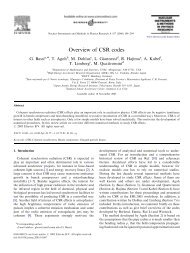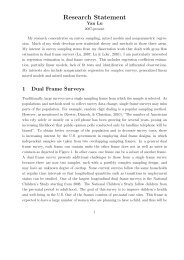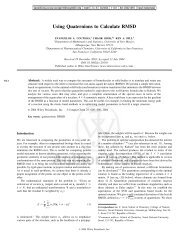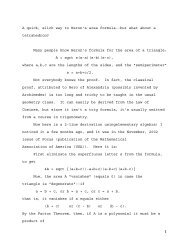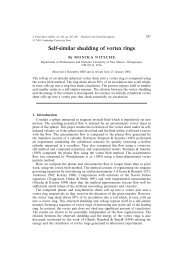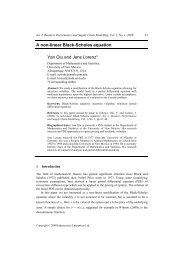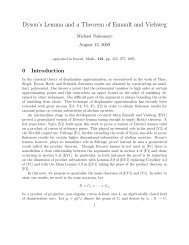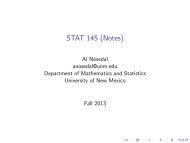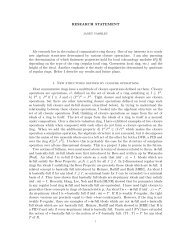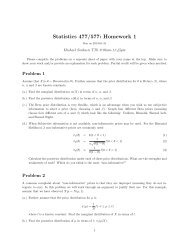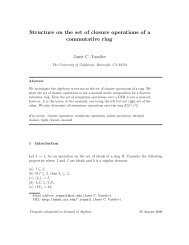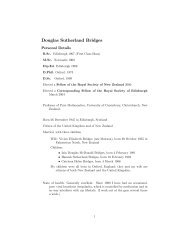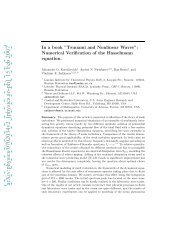OEO Office of Equal Opportunity - Department of Mathematics and ...
OEO Office of Equal Opportunity - Department of Mathematics and ...
OEO Office of Equal Opportunity - Department of Mathematics and ...
Create successful ePaper yourself
Turn your PDF publications into a flip-book with our unique Google optimized e-Paper software.
WOMEN STUDIES 303<br />
requirements may not be used to fulfill requirements for the<br />
focus areas.<br />
Minor Study Requirements<br />
The Women Studies minor consists <strong>of</strong> 21 hours as follows:<br />
Nine hours from 200, 224 or 322, 492; 3 hours from 226,<br />
498, HIST 330, 344, 345, HIST/WMST 320, 321, 322,428,<br />
462, 471, 472; Six hours from 1 focus area <strong>and</strong> 3 additional<br />
hours from one other focus area. Other courses may be used<br />
upon petition to the Director. History courses taken to fulfill<br />
core requirements may not be used to fulfill requirements for<br />
the focus areas.<br />
Women Studies (WMST)<br />
181. Seminar for Returning Women Students. (3)<br />
Designed for women who are entering or returning to school<br />
after an interruption; identifies problems associated with<br />
re-entry; reviews academic skills; provides an opportunity to<br />
begin to define educational needs <strong>and</strong> issues.<br />
200. Women: Social & Historical Perspectives. [Women<br />
in Contemporary Society.] (3)<br />
Women’s status in society: Women’s socialization by sex,<br />
class, race <strong>and</strong> culture; the economics <strong>of</strong> discrimination, <strong>and</strong><br />
role <strong>of</strong> education <strong>and</strong> family. Historical <strong>and</strong> social perspectives.<br />
{Fall, Spring}<br />
224. Introduction to Feminist Theory. (3)<br />
Introduces second <strong>and</strong> third wave feminism, <strong>and</strong> some<br />
history <strong>of</strong> first wave feminism. Analyzes theories from their<br />
origins in early feminism to their advanced principles <strong>and</strong><br />
proponents today.<br />
231. Psychology <strong>of</strong> Human Sexuality. (3)<br />
(Also <strong>of</strong>fered as PSY 231.) Exploration <strong>of</strong> the physiological,<br />
cultural, social <strong>and</strong> individual factors that influence sexual<br />
behavior, sex roles <strong>and</strong> sex identity.<br />
Prerequisite: PSY 105.<br />
233. Native American Women. (3)<br />
An interdisciplinary course that focuses on the historical, cultural,<br />
economic <strong>and</strong> political issues that affect the changing<br />
roles <strong>of</strong> Native American Women.<br />
234. Black Women Writers. (3)<br />
An exploration <strong>of</strong> works written exclusively by black women<br />
as well as a multidisciplinary approach to black women’s<br />
experiences through their own writings, art, media.<br />
250. Black Women. (3)<br />
(Also <strong>of</strong>fered as AFAM 250.) A comprehensive survey <strong>of</strong> the<br />
role Black Women has played in the society <strong>of</strong> the United<br />
States. Emphasis will be placed on achievements <strong>and</strong><br />
contributions.<br />
279. Interdisciplinary Topics. (1-3) ∆<br />
Can be repeated for credit three times by students earning a<br />
major or minor in Women Studies.<br />
298. Feminist Research <strong>and</strong> Writing Lab. (1)<br />
Develops writing skills used in feminist scholarship, <strong>and</strong><br />
applies feminist research methodologies in a lab setting.<br />
308. Sociology <strong>of</strong> Gender. (3)<br />
(Also <strong>of</strong>fered as SOC 308.) How <strong>and</strong> why societies create<br />
gender categories. How do definitions <strong>of</strong> “masculinity” <strong>and</strong><br />
“femininity” vary? What are the costs <strong>and</strong> benefits <strong>of</strong> being<br />
male or female in contemporary American society?<br />
Prerequisite: SOC 101. {Fall, Spring}<br />
313. Women <strong>and</strong> the Law. (3)<br />
(Also <strong>of</strong>fered as POLS 313.) A survey <strong>of</strong> legal issues affecting<br />
women. Examines the historical development <strong>and</strong> current law<br />
<strong>of</strong> equal opportunity, sexual harassment, pay equity, sports,<br />
family, reproduction <strong>and</strong> sexual violence.<br />
Prerequisite: POLS 303.<br />
314. Women’s Contemporary Legal Issues. (3)<br />
(Also <strong>of</strong>fered as POLS 314.) This course focuses on legal<br />
issues <strong>of</strong> current concern affecting women, <strong>of</strong>fering more<br />
intensive focus than 313. Potential topics include sexual<br />
harassment, domestic violence, child support enforcement,<br />
lesbian legal issues, pay equity.<br />
Prerequisite: POLS 303.<br />
320./520. History <strong>of</strong> Women from Ancient Times to the<br />
Enlightenment. (3) Slaughter<br />
(Also <strong>of</strong>fered as HIST 320.) Study <strong>of</strong> sex roles in primitive<br />
societies, classical views <strong>of</strong> women, the Judeo-Christian<br />
treatment <strong>of</strong> women, medieval social roles <strong>and</strong> the changes<br />
that came with the Renaissance <strong>and</strong> Reformation. Attention<br />
will be paid to the role <strong>of</strong> women in the family <strong>and</strong> to their<br />
economic function as well as to the less common activities <strong>of</strong><br />
saint, witch <strong>and</strong> revolutionary.<br />
321. Women in the Modern World. (3) Hutchinson,<br />
Scharff, Schibeci, Slaughter<br />
(Also <strong>of</strong>fered as HIST 321.) Study <strong>of</strong> western women from<br />
pre-industrial to contemporary society which will focus on<br />
Victorianism, familial roles, changes in work patterns, feminist<br />
movements <strong>and</strong> female participation in fascist <strong>and</strong> revolutionary<br />
politics.<br />
322. Race, Class <strong>and</strong> Feminism. (3)<br />
This course will open discussion on the significance <strong>of</strong> race<br />
<strong>and</strong> class as an integral component in the development <strong>of</strong><br />
feminist movements.<br />
324. Contemporary Feminist Theory. (3)<br />
An investigation <strong>of</strong> selected feminist theories from the past<br />
three decades. Learning the skills <strong>of</strong> analysis <strong>and</strong> applying<br />
these skills to theory will be stressed.<br />
326. Gender <strong>and</strong> Communication. (3)<br />
(Also <strong>of</strong>fered as CJ 326.) Study <strong>of</strong> the relationship between<br />
gender <strong>and</strong> communication with specific attention to how<br />
gender affects language, verbal <strong>and</strong> nonverbal communication<br />
practices <strong>and</strong> how women’s movements have attempted<br />
to transform gendered communication practices.<br />
330. History <strong>of</strong> the Women’s Rights Movement. (3)<br />
Slaughter<br />
(Also <strong>of</strong>fered as HIST 322.) A detailed study <strong>of</strong> the movements<br />
for women’s rights in the U.S., Europe <strong>and</strong> Latin<br />
America in the 19th <strong>and</strong> 20th centuries. The topic’s approach<br />
will emphasize the movement’s relation to <strong>and</strong> impact on<br />
broader historical questions.<br />
331. Third World Women. (3)<br />
A survey <strong>of</strong> women in various Third World regions in turn:<br />
Asia, Africa, North <strong>and</strong> Latin America, the Middle East. Titles<br />
<strong>of</strong> individual sections may vary as regions vary.<br />
332. Introduction to Chicana Studies. (3)<br />
(Also <strong>of</strong>fered as CHMS 332.) An introduction to the interdisciplinary<br />
field <strong>of</strong> Chicana Studies. Includes historical <strong>and</strong> contemporary<br />
research on labor, political involvement, cultural<br />
studies <strong>and</strong> feminism.<br />
334./534. Language <strong>and</strong> Gender. (3)<br />
(Also <strong>of</strong>fered as LING 334.) This course provides an introduction<br />
to linguistic analyses <strong>of</strong> language used by <strong>and</strong><br />
about women <strong>and</strong> men, exploring how language is used in<br />
constructing ourselves <strong>and</strong> others as men <strong>and</strong> women, gay,<br />
straight or transgendered.<br />
335. Lesbian Culture <strong>and</strong> Politics. (3)<br />
Descriptive <strong>and</strong> theoretical focus on lesbian women in society<br />
<strong>and</strong> within the women’s movement; consideration <strong>of</strong> issues<br />
relevant to Lesbian identity.<br />
339. Women <strong>and</strong> Cultural Violence. (3)<br />
An examination <strong>of</strong> cultural violence toward women (rape,<br />
domestic violence, sexual harassment, emotional <strong>and</strong> verbal<br />
abuse, media images, etc.) through political, economic, psychological,<br />
social <strong>and</strong> cultural perspectives.<br />
ARTS AND<br />
SCIENCES<br />
UNM CATALOG 2006–2007 Symbols, page 611.



